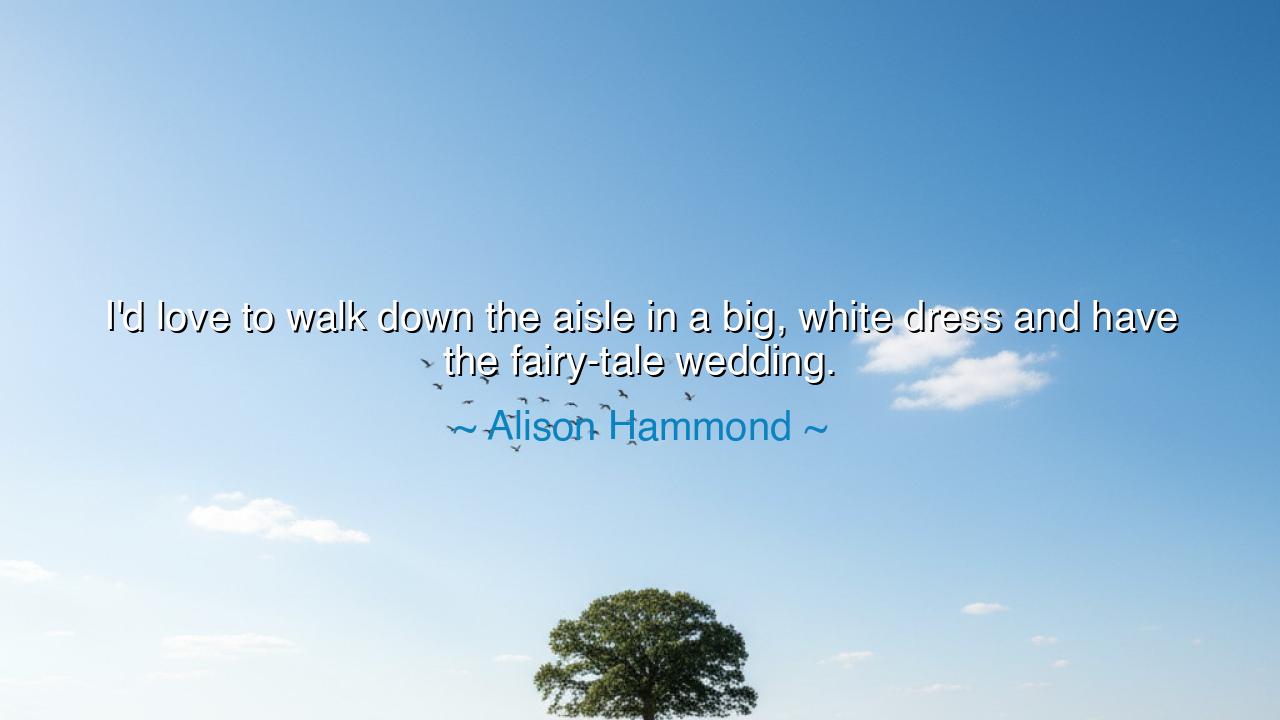
I'd love to walk down the aisle in a big, white dress and have






Hearken, O children of longing and imagination, to the words of Alison Hammond, who speaks with the radiant yearning of one dreaming of a fairy-tale wedding. She envisions herself walking down the aisle in a big, white dress, a symbol of purity, joy, and the sacred passage into union and commitment. In these words lies the eternal teaching: that the human heart often craves ceremony and spectacle, not merely for display, but as a vessel to hold the deep emotions of love, hope, and aspiration.
This utterance reminds us that the rites of marriage are imbued with symbolism. The white dress has long been revered across cultures as a mark of new beginnings, of innocence, and of the promise of a shared future. From the medieval courts of Europe to the grand palaces of Asia, the attire of the bride has served as both declaration and celebration, a visual hymn to the union of two souls, resonating with ancestors who first recognized the power of ritual in shaping memory and destiny.
Consider the tale of Grace Kelly, who, in 1956, ascended from Hollywood stardom to royalty, walking in a resplendent white gown that became immortalized in the annals of history. Her wedding was not merely a spectacle of wealth, but a reflection of a deep yearning for love and commitment, a tangible manifestation of dreams woven into reality. Hammond’s desire echoes this timeless human pursuit: to honor the inner longing for beauty, ceremony, and profound connection.
Yet within this dream lies the subtle wisdom of balance. The fairy-tale wedding is not solely about adornment or grandeur, but about the experience of joy, togetherness, and sacred ritual. The ancients taught that ceremonies anchor the soul, marking transitions with ritual, presence, and reverence. Hammond’s words illuminate this truth: the spectacle becomes meaningful only when it serves the heart’s genuine celebration of love and union.
Let all who hear this lesson understand that the longing for fairy-tale moments is universal, a bridge between imagination and reality. The attire, the procession, the grandeur—all are conduits to memory, emotion, and shared joy. Through these symbols, humans have for centuries expressed the depth of their hopes, the solemnity of commitment, and the radiance of new beginnings.
Thus, O seekers of wisdom, carry this teaching within you: to dream of a fairy-tale wedding is not mere whimsy, but a reflection of the soul’s desire to honor love, ritual, and continuity. Walk your own aisle, whether grand or simple, with intention and heart, and let the ceremony, like a lantern in the night, illuminate the eternal bond that unites two hearts in devotion and joy.






RCRirian Chris
I can totally understand the desire for a fairy-tale wedding. It seems like a perfect way to mark such a special moment. But, do you think the whole 'fairy-tale' expectation can sometimes lead to disappointment if things don’t go exactly as planned? How do you imagine making sure it stays true to your vision no matter what?
TNNguyen Ngoc Thien Nhan
That sounds like such a dream! But it got me thinking, how do you balance the idea of a fairy-tale wedding with the reality of what weddings can be like these days? There’s often so much to organize, and I wonder if you’d feel stressed or just pure joy in creating that magical moment.
HYNguyen Hoang hai Yen
I totally get this! A big, white dress and a fairy-tale wedding are dreams for many, and they represent such a classic vision of love and commitment. But, I wonder, do you feel any pressure from society to have that kind of wedding, or is it truly what you've always wanted?
HKPhan Vu Huy Khang
There's something so magical about the idea of a fairy-tale wedding, isn't there? The dress, the ceremony, the whole atmosphere. I wonder though, do you think that kind of traditional wedding still holds the same significance today, or is it more about the personal meaning behind the celebration?